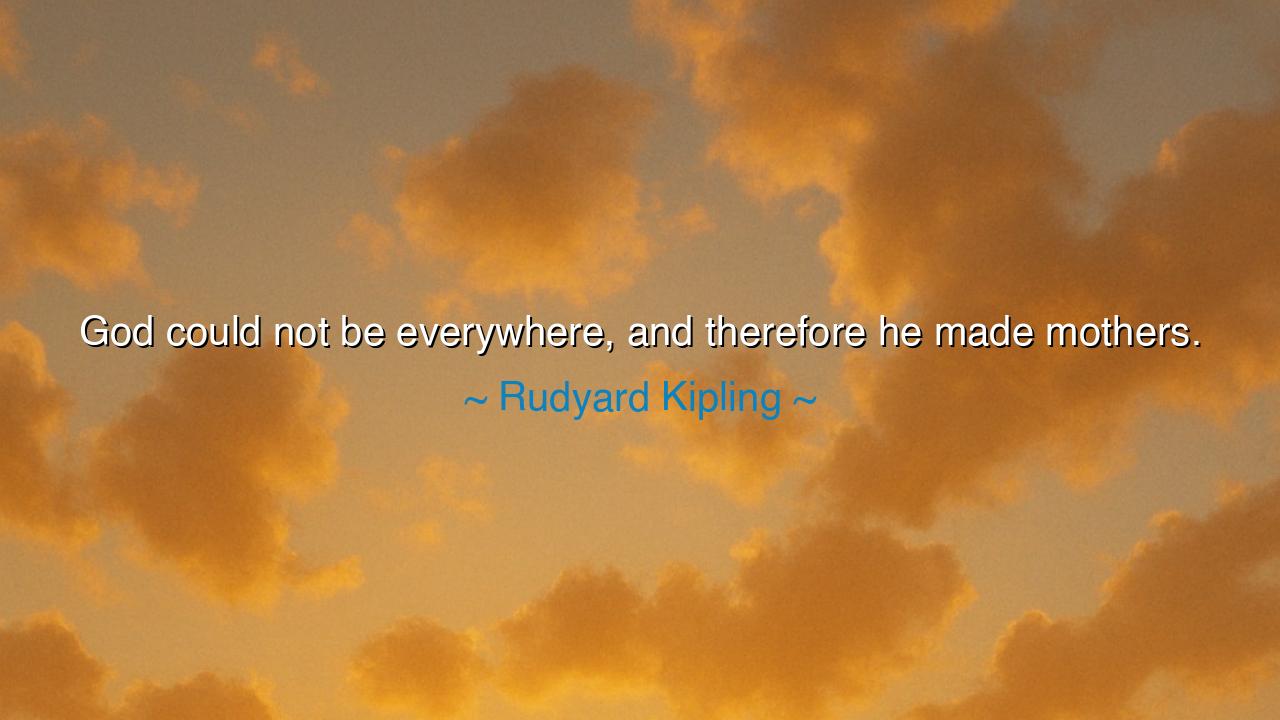
God could not be everywhere, and therefore he made mothers.






“God could not be everywhere, and therefore He made mothers.”
So wrote Rudyard Kipling, poet of empires and weaver of human truths, whose words have echoed through generations like a benediction. This saying, tender and profound, is not a theological argument, but a poetic revelation — a recognition of the sacred power embodied in motherhood. In these few words, Kipling unveils an ancient truth: that motherhood is not merely a human duty, but a divine calling — a reflection of God’s own care, mercy, and creative love manifested in flesh and heart.
In the ancient manner, let us look deeply into this saying. When Kipling declared that God could not be everywhere, he did not mean that the Divine is limited, but that the infinite love of God required earthly vessels — hands to cradle, hearts to nurture, eyes to watch over the fragile miracle of life. Thus, mothers became the living emissaries of divine tenderness, the presence of God in the ordinary. Every mother, whether she knows it or not, bears within her a spark of the eternal — the instinct to protect, to comfort, to give without measure. In her, heaven bends low to touch the earth.
The origin of these words may be traced to Kipling’s deep reverence for the maternal figure. His own life was marked by separation from his mother at a young age — sent away from India to England, he endured loneliness and hardship. From that sorrow grew his lifelong awe for maternal love, the one force he saw as closest to divine constancy. To him, the mother’s embrace was not mere affection but salvation — the earthly echo of a celestial compassion that never abandons. His words are thus both praise and remembrance, born of loss and wonder.
Throughout the ages, the image of the mother has stood beside that of the divine. In ancient Egypt, Isis cradled her child Horus beneath the wings of the heavens. In Christianity, Mary, the mother of Christ, became the vessel of grace, her quiet endurance reflecting God’s infinite patience. And in every culture — whether the nurturing mother of the hearth, the warrior mother of legend, or the grieving mother who bears her sorrows in silence — we see the same truth: that motherhood is creation continued, love made manifest in endurance and sacrifice.
Consider the story of Florence Nightingale, the “Lady with the Lamp.” Though she bore no children of her own, she embodied the same maternal spirit Kipling praised. In the dark halls of war hospitals, she tended to the wounded as a mother tends to her child, her lamp glowing like the mercy of God amid death and despair. She showed that motherhood is not confined to blood, but to the willingness to give of oneself utterly for the sake of life and healing. In her compassion, she became proof that divine love walks the earth wherever a heart dares to nurture.
Kipling’s saying also carries a quiet challenge. For if mothers are the reflections of God, then to honor them is to honor the divine itself. In an age that races toward ambition and forgets reverence, his words remind us to remember the sacredness of care — the unseen labor of love that sustains the world. It is the mother’s patience that shapes the dreamer, her faith that steadies the wanderer, her forgiveness that redeems the fallen. To forget her is to forget the root of mercy itself.
The lesson, then, is clear: cherish and honor those who bear the spirit of motherhood — not only in the home but in every act of compassion. Speak words of gratitude while time still allows. Tend to others as a mother would — with gentleness, endurance, and unwavering hope. For every soul that nurtures another becomes, in that moment, a vessel of the divine presence Kipling spoke of. If God could not be everywhere, He entrusted His love to human hearts — to mothers, and to all who live by their example.
So let us remember this truth and pass it onward: that the world endures not by power or pride, but by the quiet strength of motherly love, which mirrors the eternal. And when we look upon the face of a mother — tired, patient, radiant — let us see in her not only the giver of life, but the reflection of God’s own unending care.






AAdministratorAdministrator
Welcome, honored guests. Please leave a comment, we will respond soon